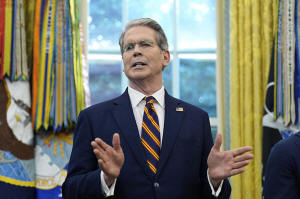US and China reach a framework deal for the ownership of TikTok
[September 16, 2025] By
JOSH BOAK, SUMAN NAISHADHAM and DIDI TANG
MADRID (AP) — A framework deal has been reached between China and the
U.S. for the ownership of popular social video platform TikTok, U.S.
Treasury Secretary Scott Bessent said after weekend trade talks in
Spain.
Bessent said in a press conference after the latest round of trade talks
between the world's two largest economies concluded in Madrid that U.S.
President Donald Trump and Chinese President Xi Jinping would speak
Friday to possibly finalize the deal. He said the objective was to
switch to U.S. ownership from China’s ByteDance.
“We are not going to talk about the commercial terms of the deal,”
Bessent said. “It’s between two private parties. But the commercial
terms have been agreed upon.”
Li Chenggang, China's international trade representative, told reporters
the sides have reached “basic framework consensus” to resolve
TikTok-related issues in a cooperative way, reduce investment barriers
and promote related economic and trade cooperation.
The meeting in Madrid is the fourth round of trade talks between U.S.
and Chinese officials since Trump launched a tariff war on Chinese goods
in April. A fifth round of negotiations is likely to happen “in the
coming weeks,” Bessent said, with both governments planning for a
possible summit between Trump and Xi later this year or early next year
to solidify a trade agreement.
However, nothing has been confirmed, and analysts say possible trade
bumps could delay the visit.

Why a TikTok deal is needed
In Madrid, U.S. Trade Representative Jamieson Greer said the team was
“very focused on TikTok and making sure that it was a deal that is fair
for the Chinese” but also “completely respects U.S. national security
concerns.”
Wang Jingtao, deputy director of China’s Central Cyberspace Affairs
Commission, told reporters in Madrid there was consensus on
authorization of “the use of intellectual property rights such as
(TikTok’s) algorithm” — a main sticking point in the deal.
The sides also agreed on entrusting a partner with handling U.S. user
data and content security, he said.
During Joe Biden’s Democratic presidency, Congress and the White House
used national security grounds to approve a U.S. ban on TikTok unless
its Chinese parent company sold its controlling stake.
U.S. officials were concerned about ByteDance’s roots and ownership,
pointing to laws in China that require Chinese companies to hand over
data requested by the government. Another concern became the proprietary
algorithm that populates what users see on the app.
Trump, a Republican, has repeatedly extended the deadline for shutting
down TikTok. The current extension expires Wednesday, two days before
Trump and Xi are scheduled to discuss the final details of the framework
deal.
Although Trump hasn’t addressed the forthcoming deadline directly, he
has claimed that he can delay the ban indefinitely.
Wendy Cutler, senior vice president at the Asia Society Policy
Institute, said it appears that “both sides have found a way forward to
transfer ownership to a U.S. company."
“If accurate, this would represent an important step forward in
resolving a lingering bilateral dispute,” she said.

[to top of second column] |

Treasury Secretary Scott Bessent speaks in the Oval Office of the
White House, Friday, Sept. 5, 2025, in Washington, during an event
with President Donald Trump. (AP Photo/Alex Brandon)
 Fentanyl and other issues are
still unresolved
Other long-running issues like export controls, Chinese investments
in the U.S. and restrictions on chemicals used to make fentanyl also
came up. Bessent indicated that money laundering, related to drug
trafficking, “was an area of extreme agreement."
Chinese Vice Premier He Lifeng, who led the Chinese delegation, said
the sides held “candid, in-depth and constructive” communications,
according to China’s official news agency Xinhua.
But Li, China’s international trade representative, said Beijing
opposes the “politicization” and “weaponization” of technology,
trade and economic issues, adding that China would “never seek any
agreement at the expense of principle, the interests of the
companies, and international fairness and justice.”
He criticized the U.S. for overstretching the concept of national
security and imposing sanctions on more Chinese companies. Calling
it “a typical, unilateral, bullying practice,” Li said China
demanded restrictive measures be removed.
“The U.S. side should not on one hand ask China to accommodate its
concerns, whilst at the same time continue to suppress Chinese
companies,” Li said.
As the weekend talks were underway, Trump said the war in Ukraine
would end if all NATO countries stopped buying Russian oil and
placed tariffs on China of 50% to 100% for doing so. The Chinese
Commerce Ministry on Monday called the demand “a classic example of
unilateral bullying and economic coercion."
A leaders' summit may be in sight
China's foreign ministry on Monday did not say if Beijing has
invited Trump for a state visit.
Analysts have suggested that the summit of the Asia-Pacific Economic
Cooperation countries in South Korea at the end of October could
provide an opportunity.

The plan for another round of trade talks is “encouraging but seems
to be cutting things close,” Cutler said, adding that more work is
needed at lower levels for a Trump-Xi meeting to take place and that
there are other opportunities for them to meet next year.
For now, “there is little time to hammer out a meaningful trade
agreement,” she said. “What we are more likely to see is a series of
ad-hoc deliverables, possibly a Chinese commitment to buy more U.S.
soybeans and other products, a U.S. agreement to hold back on
announcing certain further U.S. high-tech export controls, and
another 90-day rollover of the tariff pause.”
___
Boak and Tang reported from Washington. Associated Press writer Mark
Sherman in Washington contributed to this report.
All contents © copyright 2025 Associated Press. All rights reserved |